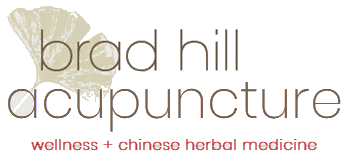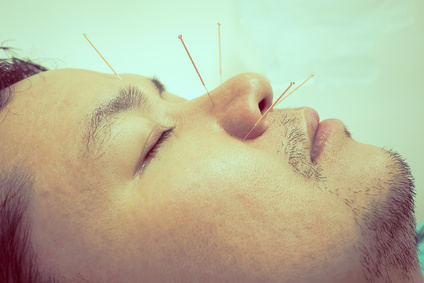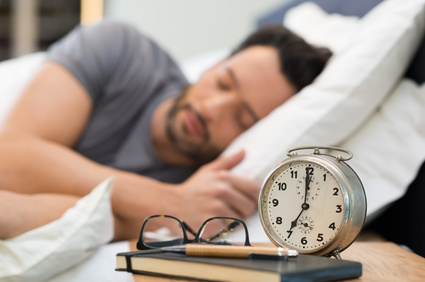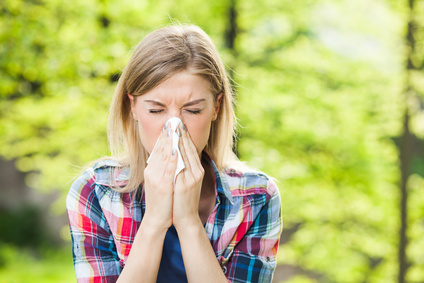Itchy eyes, frequent sneezing, and a runny nose are just the start of the laundry list of nuisances brought on by allergies. When you’re a frequent allergy sufferer, you know exactly how miserable your allergies make you and how much they can affect your life. They make exercise, sleep, and work difficult and sometimes even downright impossible. If you’ve tried traditional allergy medications and find they only make you drowsy, irritable, or wound tighter than a guitar string, have you considered trying eastern Chinese medicine to ease your suffering? Acupuncture and Chinese herbal medicine have long been used to treat a variety of ailments, including allergies.
Acupuncture
Most people know the basics of acupuncture: you have tiny needles inserted into your skin and you walk out of the office a brand new person. But to understand exactly how acupuncture can help treat your allergies, you need to know what acupuncture does to your body during treatments.
Chinese medicine believes that the body’s health is based upon the channels of energy flow throughout the body, also known as qi. It is qi that keeps our bodies healthy. If the qi is interrupted, our bodies become susceptible to a variety of diseases and ailments. Acupuncture can relieve these energy disruptions when the needles are inserted into specific meridians of the body that lie just beneath the skin.
When you go see an acupuncture therapist for allergies, they’ll ask you what symptoms you’re experiencing. Most likely, they’ll be pinpointing meridians in your body along the chest, face, and back (for the lungs) to clear any qi blockages in those areas. Once those areas are released, your body can stop producing histamine in response to environmental allergies.
Chinese medicine believes that allergies are related to “Wind” (versus Water or Earth) because of their ability to come and go. They’ll also look you over to see if your allergies are related to a deficiency in your kidneys or spleen. Overall, your therapist will be treating the symptoms but they’ll also be looking over any underlying causes to provide even more long term relief.
A recently performed study used 422 participants who all tested positive for pollen allergies. They were then divided into three groups: one group underwent 12 acupuncture sessions and took antihistamines as needed, the second received 12 fake acupuncture sessions and took their medications as needed, and the third took only antihistamines. After two months, the group who received acupuncture showed the greatest improvement in their allergy symptoms and significantly reduced their usage of allergy medications. While their symptoms returned within four months of treatment, it showed that patients might need regular treatment to find relief.
Chinese Herbal Medicine
If acupuncture isn’t your thing but you like the idea of Chinese medicine, you can also treat your allergies with traditional Chinese herbal medicine. The two are more effective when used in conjunction with each other rather than using just one or the other.
There are a variety of specific Chinese herbs that are used to dry up mucus/phlegm, relieve cough, and help relieve itchy and red eyes.
- Japanese Catnip and Fang Feng are known for their ability to dispel Wind, one of the reasons you suffer from allergies according to Chinese medicine.
- Angelica dahurica, xin yi hua, and Xanthium sibiricum are prized for their abilities to dry up mucus and provide relief to runny noses.
- Butterbur is a natural herb that is similar to antihistamines in its effect. Some studies have shown it is as effective as over the counter antihistamines.
- Quercetin is another naturally occurring antihistamine.
- Euphrasia oficinalis has effectively treated the symptoms of hay fever for centuries. It’s particularly effective at treating congestion and watery eyes.
A study performed in 2004 used 52 patients that used a combination of weekly acupuncture therapy and herbal tinctures. Their acupuncture appointments focused on the gallbladder, intestines, lung and liver and lasted 20 minutes; additional meridians were targeted depending on what kinds of symptoms the participants were suffering from. They were given a traditional Chinese medicine tincture that they were instructed to take three times a day. The control group was given a basic acupuncture appointment and an herbal concoction made with non-specific herbs. At the end of the study, remission rates were double in the first group than in the control group.
If you’re not getting the allergy relief you want from medications, you should consider trying acupuncture and Chinese herbal remedies. Thousands of Americans have touted the benefits of acupuncture in treatment of their various ailments, and it’s been shown that is has a profound effect on allergy symptoms, too.








